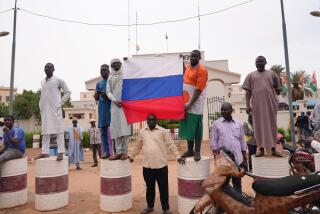It’s Protests Vs. Prayers in Nigeria
- Share via
NAIROBI, Kenya — Opposition groups in Nigeria have vowed to go ahead with pro-democracy protests today despite warnings from military authorities that the country should be quietly mourning Gen. Sani Abacha, the Nigerian strongman who died Monday.
“This is a time for prayers,” said Lagos military administrator Col. Mohammed Marwa, referring to a monthlong mourning period declared by military officials. “Such demonstrations are unnecessary at this point in time.”
The opposition action is intended to mark the fifth anniversary of the country’s last presidential elections. The vote was annulled by the military leadership, and amid the chaos, Abacha stepped in.
The next five years were marked by one of Africa’s most ruthless reigns of terror, which included the execution of human rights activists and the jailing of leading opposition figures.
Even with Abacha’s sudden death, protest organizers said there remains an urgency to focus attention on the 1993 ballot because the military grip on power is as tight as ever.
On Tuesday, career soldier Gen. Abdulsalam Abubakar was selected by army officials as the country’s eighth military ruler since independence from British rule in 1960.
Just three days on the job, Abubakar has promised to turn over power to civilians by Oct. 1.
However, many pro-democracy leaders are skeptical of pledges by the military, particularly because Abacha was a master of deception, having rigged presidential elections scheduled in August so that he would be the only candidate.
“The action shall be a mark of concrete rejection of the continuation of military rule,” the United Action for Democracy, a coalition of opposition groups, said in a statement. “The current Abubakar concoction is clearly unacceptable.”
Although police have declared the planned protests illegal and have hinted that they may break them up, a major turnout is not expected. There have been contradictory signals from pro-democracy groups--some have called for street demonstrations while others have urged a 24-hour stay-at-home strike--and Nigerians have shown a growing sense of apathy about the country’s dire political and economic predicament.
“The pro-democracy activists haven’t been able to rally the troops since 1993, when people were killed on the streets of Lagos,” a Western diplomat in Lagos said by telephone. “I don’t get the feeling that there is a massive protest in the works.”
Many Nigerians have grown fearful of speaking their minds publicly. When riots erupted in the southwestern city of Ibadan in May, security forces shot and killed seven protesters. Earlier this month, when the Joint Action Committee of Nigeria, another grouping of opposition organizations, called for mass demonstrations in Lagos, protesters numbered in the dozens, not hundreds or thousands.
Some of the apathy is borne out of economic necessity.
Even with its oil wealth, Nigeria is in economic ruin, and most people are consumed by the day-to-day regimen of getting by. Others may stay away today out of respect for the dead. Abacha was by no means a beloved leader, but honoring his passing is regarded as the proper thing to do.
The badly fractured democracy movement has also hurt its own cause, analysts said, because leaders have been unable to overcome hostilities among different ethnic and religious groups that have long divided the country. Those divisions now keep opponents of military rule from presenting a united front.
Jean Herskovits, a scholar on Nigeria at the State University of New York, said many Nigerians are more willing than the “career opposition leaders” to give Abubakar a chance at turning things around.
Herskovits said ordinary Nigerians are no fonder of the military regime than are the outspoken activists, but they have no vested interest in keeping things stirred up.
“The support for this opposition is very shallow,” she said. “People are opposed to military rule . . . but they also see the new leadership as an opportunity for change.”
Although it may be too early to tell if Abubakar is a democrat in battle fatigues, Herskovits said many Nigerians accept that the general needs to be given a chance.
“This was not a coup that people were planning for a long time,” she said of Abubakar’s ascent. “This was a very sudden thing for which no one was prepared. People need to be given some breathing space.”
More to Read
Sign up for Essential California
The most important California stories and recommendations in your inbox every morning.
You may occasionally receive promotional content from the Los Angeles Times.










